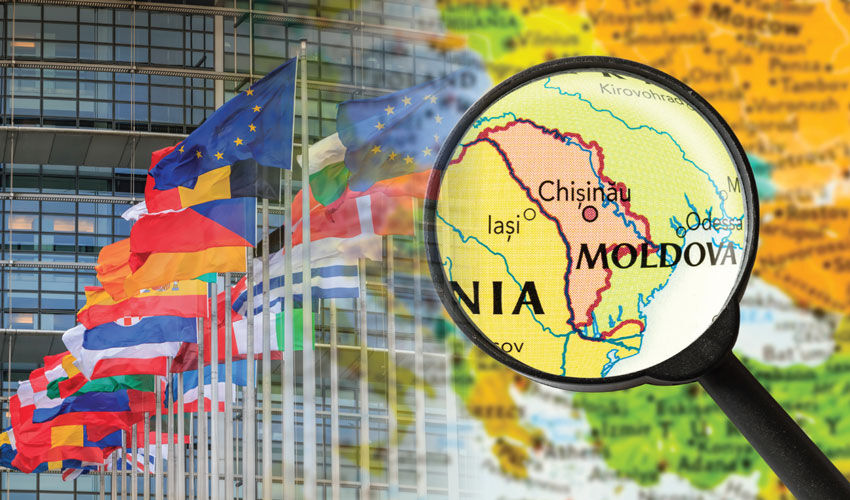
The progress of preparations for European integration was assessed at 3 points. The evaluation of the second independent report on monitoring Moldova’s implementation of the European Commission’s recommendations was carried out by the independent analytical center Expert-Grup. The pain points are everywhere, we present some of them.
The monitoring was conducted for all 12 monitored chapters in the cluster “Basic elements” of the EU accession process, the monitoring period – from July 1, 2024 to May 31, 2025. Expert assessments were made for each of the following topics – democracy; public administration reform; justice reform; anti-corruption; fundamental rights; freedom of expression; security; functioning of the market economy; public procurement; statistics; financial control; social policy and employment. The presented conclusions will be included in the European Commission’s first Enlargement Report for the Republic of Moldova, which will be published in the fall of this year.
Adrian Lupusor, Executive Director of Expert-Grup, said:
“The average score of 3.2 across all 12 monitored chapters in the Core Elements cluster indicates that notable progress has been made, but work needs to continue. Numerous constraints, including limitations related to the institutional capacity of the authorities, are increasingly evident. Low salaries, understaffing in public institutions all pose a serious challenge given our ambitious program.”
But the problem, as the report makes clear, is also another. The overall satisfactory score was made up of very different degrees of progress in individual areas, ranging from zero in the area of media freedom and independence to good in the areas of statistics and financial control. The economic agenda remains very controversial, especially in the areas of regulatory policy. Blind transposition of European norms, even when adjusted to national peculiarities, does not become a panacea.
Another problem is the divergence of opinions and views in certain areas. Coherence not only with legislation but also with practice is an important condition, and the implementation of uniform norms differs greatly from country to country. The ability to combine theory and practice, taking into account national peculiarities, is crucial, according to the experts of the Independent Center.
Functioning of the market economy
Several “breakthroughs” were identified in this chapter (with an average score of 3.3 out of 5 points) – capital investment planning, reforming the Labor Inspectorate and launching the Program to Reduce Undeclared Work. However, experts note that there has been no progress on “overhauling the tax system in terms of encouraging workers to move into declared work.” In addition, in July 2025, the law on freelancers was adopted, which opens, according to European models, great opportunities for legalization of individuals and the transfer of their activities in a formalized direction. But the law may turn out to be “stillborn” as far as we are concerned.
The authors argue that there are still systemic barriers in the country, such as the perception of the population and business of the process of compliance with tax legislation. It is ambiguous and is seen as a very costly endeavor, almost impossible for survival conditions. And cash payments, social tolerance to undeclared work and low level of financial literacy among the population complete the negative attitude to the image of a “model taxpayer”.
In this regard, progress is possible, according to the authors, provided “strengthening the capacity of the Labor Inspectorate and promoting the mechanism of subsidizing wage increases, as well as – promoting the pilot project “Digital vouchers for day laborers” with the prospect of its expansion throughout the country”.
“Expert-Grup: “Progress has been made in the social sphere under the section “Social Policy and Employment” (average score 3.5 out of 5). The National Employment Agency reported a significant increase in the number of people employed, from 11,000 in 2023 to 16,700 in 2024, as well as an increase in the occupancy rate of vacancies reported by employers (80.9%). However, there remains a significant imbalance between labor supply and demand, both territorially and occupationally, with 60% of the registered unemployed lacking professional qualifications. The launch of a new tool for reporting undeclared work – the platform www.lucrezlegal.md and the Decent Work Program for 2025-2027 have not yet proven effective.”
According to experts, there are clear advances in the sections “Public Procurement” (beginning of the process of centralization and unification), “Statistics” (integration of administrative and private sources, updating of statistical studies and transfer of new data sets to Eurostat), “Financial Control” (progress of the external audit of the Court of Accounts).
But there are more shortcomings. The Ministry of Finance has updated the portfolio of investment projects until 2026 and finalized the IS “Investment Projects Register”. But the use of the system remains questionable – the mechanism for monitoring investment projects is unrealized. In particular, feasibility studies of projects and the level of funds utilization are not published.
“Expert-Grup: “The reform of state-owned enterprises is progressing slowly. Despite tenders for the selection of independent board members and some reorganizations, there are still problems related to transparency, corporate governance and politicization of processes. Similarly, contrary to legal provisions, a government report on state property management has not been submitted to Parliament. Urgent measures are needed to professionalize governance, accelerate privatization and extend the economic development strategy to state-owned companies.”
Public procurement
Economic management is, of course, affected by regional instability and electoral pressures. In 2025, the budget deficit increased to 5.2% of GDP despite some fiscal consolidation efforts. In this regard, the rationality of public procurement, according to the authors, should come to the forefront.
In the aspect of harmonization with EU legislation, key bills have been drafted, including a new Law on Public Procurement and Law on Defense and Security Procurement, and a new Law on Concessions for Works and Services has been approved. Model specifications for certain types of procurement have also been developed. However, some of the planned activities were excluded, canceled or postponed until the approval of changes to the National Program for the Development of the Public Procurement System.
“Expert-Grup: “Significant progress has been made with the signing of a grant for the development of a new electronic procurement system, but its implementation is not within the agreed timeframe. The lack of clear transparency and performance indicators, especially for low-value procurement, limits the ability to monitor such procurement. The Public Procurement Agency continues to carry out oversight activities, but its capacity is affected by staff shortages and low levels of professionalism.”
Concessions
There is a clear backlog here. Although the regulatory framework for public-private partnerships and concessions has been updated, it has not yet been harmonized with EU legislation. Problems such as lack of transparency, limited competition and administrative barriers remain. It is necessary to revise PPP legislation, integrate concessions into a single regulatory framework and ensure full transparency of processes to attract investment and protect the public interest, the report says.
Freedom of expression
As for this chapter (average score of 2.6 out of 5), the authors warn that the European integration agenda here is essentially a failure. When it comes to freedom of the press, despite recent legislative and policy initiatives, the question remains open. Although a draft law was passed in July 2025 to ensure the independence of the public broadcasting service and audiovisual body, its implementation is not guaranteed by the relevant regulations.
A particularly problematic aspect remains the legal framework that allows the suspension of broadcasting licenses out of court, citing national security concerns. This practice is contrary to European jurisprudence on freedom of expression. In addition, a new law on press is needed.
“Expert-Grup: “Priorities in this area include: adopting a new media law, drafted as early as 2024; revising license suspension mechanisms in line with the rule of law; strengthening the Press Council; and ensuring the independence of state and media regulators.” Delayed transposition of these provisions maintains an opaque legal framework, particularly for print and online media, and the reliance of editorial boards on opaque funding limits pluralism. The lack of an effective system of self-regulation, as well as the failure to strengthen the Press Council, seriously affects the application of ethical and deontological standards in journalism.”
On behalf of civil society, the experts plan to broaden the scope of monitoring to include the roadmaps for the preparation of the negotiation process, as well as the Reform Agenda of the EU-Moldova Development Plan, in order to ensure a crucial element of accountability of the authorities – the assessment of progress achieved.



